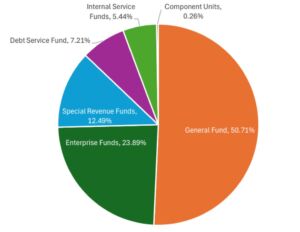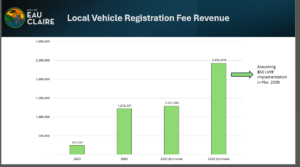October 30, 2025
A City Budget in Focus:
Priorities in revenue, economic development, parking, and appropriation shifts; what could a changing budget mean for the Chippewa Valley?
A city budget is both a monetary document and a mirror that reflects a city's position on issues. It identifies short-term values, pinpoints financial challenges, and expected growth, while acknowledging where previous budgets fell short. The money a city receives (from taxes, fees, charges, etc.) is called revenue. For Example, in the City of Eau Claire, the general fund is the "largest of the City's operating funds and provides for City services most familiar to residents, with the primary sources of revenue being the property tax," says Eau Claire's City Manager, Stephanie Hirsch (City Manager's Budget Message). Appropriations are what the city spends its revenue on. For example, the 2026 proposed operating budget includes appropriations for police and fire protection, snow plowing, street maintenance, and employee payroll and healthcare costs (more on that later). As we move further into the fall season, the Eau Claire City Council held several budget work sessions (Tuesday, October 14th, and Tuesday, October 28th). These sessions provided time to amend the proposed budget before the November 3rd amendment deadline. deadline. All of this will culminate in a formal public hearing on November 10th, followed by a meeting on November 11th, where the City Council will take action on the budget (Chamber Business Advocate). With all that said, what does the 2026 proposed operating budget for the City of Eau Claire look like?
 The 2026 proposed operating budget consists of several parts. These parts range from acknowledgements, structural documents, planned inspections, community services, economic development, all the way to reviewing the debt service. service. In the words of Eau Claire's City Manager, Stephanie Hirsch, "the budget document includes highlights from 2025, outlines new and ongoing projects for 2026, and discusses the fiscal challenges we face in maintaining City services" (City Manager's Weekly Update 10/3/25). With an expected 4.5 percent increase over 2025, sitting around $100.8 million, the 2026 budget hopes to support the City's workforce, ensuring that high-quality services continue to be delivered to the community. While the budget includes a wider range of appropriations and revenue sources, there are notable changes to Eau Claire’s Economic Development Fund, Parking Fund, and Local Vehicle Registration Fee (LVRF).
The 2026 proposed operating budget consists of several parts. These parts range from acknowledgements, structural documents, planned inspections, community services, economic development, all the way to reviewing the debt service. service. In the words of Eau Claire's City Manager, Stephanie Hirsch, "the budget document includes highlights from 2025, outlines new and ongoing projects for 2026, and discusses the fiscal challenges we face in maintaining City services" (City Manager's Weekly Update 10/3/25). With an expected 4.5 percent increase over 2025, sitting around $100.8 million, the 2026 budget hopes to support the City's workforce, ensuring that high-quality services continue to be delivered to the community. While the budget includes a wider range of appropriations and revenue sources, there are notable changes to Eau Claire’s Economic Development Fund, Parking Fund, and Local Vehicle Registration Fee (LVRF).
Economic Development Fund
Reflecting a renewed commitment to local businesses, the Economic Development Fund is budgeted at $469,551 for 2026, a 54.3 percent increase. This fund will support the addition of a Community Development Coordinator (a role designed to help business recruitment, workforce development, and support business expansion programs), new economic opportunities, and community partnerships. partnerships. City Manager Hirsch comments that this shift of resources reflects Eau Claire's commitment to prioritizing economic development in 2026 (City Manager's Weekly Update 10/3/25). Goals for 2026 include making at least 50 business retention and expansion visits while collecting and analyzing data from those visits to shape future Eau Claire policies. This initiative will help grow relationships with business leaders and grow contacts for future partnerships (Economic Development Budget).
Parking Fund
As the City of Eau Claire prepares for demolition and construction projects, the rollout of on-street paid park systems, and the addition of a parking administrator, the Parking Fund reflects a 50 percent in crease, sitting at around $1.4 million. The Parking Administrator will oversee the new paid parking program, continue developing parking policies, ensure operational efficiency, and plan for future parking facilities. Proposed revenue increases also include raising the Local Vehicle Registration Fee (LVRF) from $24 to $50. Under the 24 dollar fee, Eau Claire generated roughly $1.2 million; however, under the $50 fee, Eau Claire estimates that it will climb to nearly $2.5 million. This increase, along with the paid downtown parking, allows for a reduction of roughly $350,000 in general fund subsidy to the parking fund, according to City Manager Stephanie Hirsch.
operational efficiency, and plan for future parking facilities. Proposed revenue increases also include raising the Local Vehicle Registration Fee (LVRF) from $24 to $50. Under the 24 dollar fee, Eau Claire generated roughly $1.2 million; however, under the $50 fee, Eau Claire estimates that it will climb to nearly $2.5 million. This increase, along with the paid downtown parking, allows for a reduction of roughly $350,000 in general fund subsidy to the parking fund, according to City Manager Stephanie Hirsch.
As the LVRF is used for transportation-related costs, such as repairing roads, paying off debt from street projects, and funding future street projects, it is relevant to speak on street operational expenses. This program is responsible for the repair and maintenance of over 358 miles of city streets, traffic signs, pavement markings, curb and gutter, and more. The budget for street operations totaled around $7 million in 2025; however, it is only budgeted for about $6.8 million in 2026.

The $350,000 from Streets' operating budget was moved to the capital budget using LVRF funding (City Manager's Weekly Update 10/3/25). The Eau Claire capital budget funds large-scale, long-term projects such as infrastructure improvements, building maintenance, and downtown parking projects. Another noticeable shift can be seen in Public Transit expenses, which rose from a budgeted $7.4 million in 2025 to $7.6 million in 2026 (see graph below).

Shifting expenses and revenue sources reflect changing priorities as documented by the proposed 2026 operational budget; however, why is it important for business owners and citizens to be aware of this change? Changes in proposed operational budgets affect the availability of public services, the public's ability to hold officials accountable, quality of life, and changes in taxes and fees. When a government shifts its revenue structure (for example, by decreasing street operational expenses), it may need to raise local taxes to compensate for the shortfall (for example, through an increase in the Local Valuation Rate Fund, or LVRF). Individuals who understand where revenue is coming from can anticipate potential tax increases and assess whether they align with the services being provided. A budget reflects a government's priorities, so understanding shifts in expenses and revenue sources is key to understanding the future of your community. In the words of City Manager Hirsch, "As we finalize the 2026 budget, we continue to weigh whether to ask more of residents or to reduce services," Hirsch wrote. "These are decisions that impact our quality of life, the strength of our local safety net, dynamics of our community partnerships, and our ability to continue to attract new residents and businesses." For citizens and business owners alike, it is ever important to be aware of these changes and understand how they affect our daily lives.
Sources:
City Manager's Weekly Update 10/3/25
City Manager's Budget Message FY 2025 ANNUAL BUDGET
Eau Claire 2026 Proposed Operating Budget
Business Advocate, Eau Claire Area Chamber of Commerce
Posted by Brennen Bolopue, Governmental Affairs Intern
bolopue@eauclairechamber.org